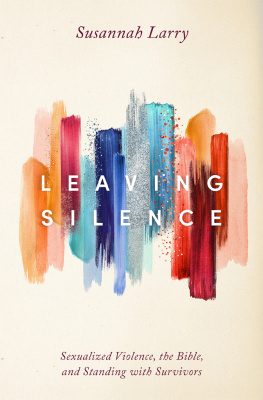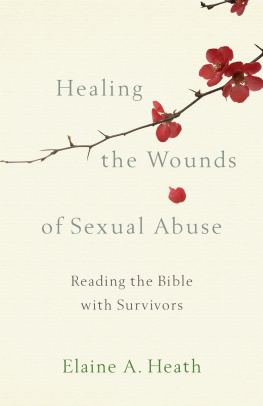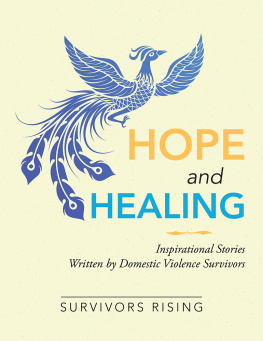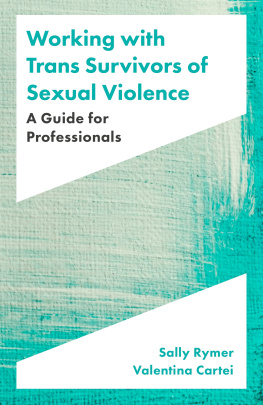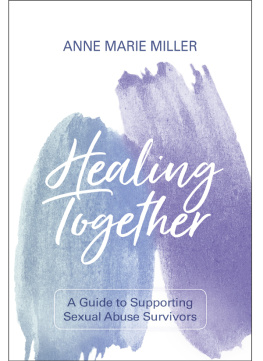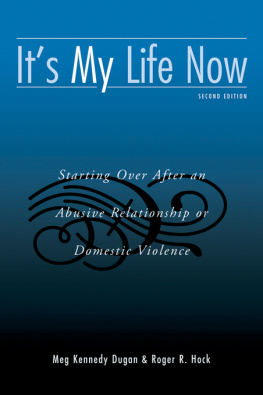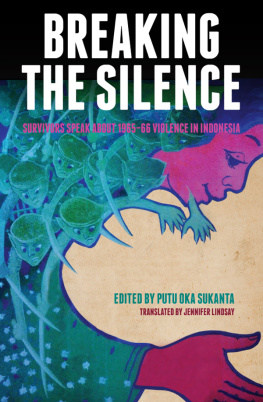Contents

Reading Leaving Silence, I was overwhelmed with Gods love for survivors through in-depth examination of Scriptures concerning sexual survivors. A God who is present. Susannah Larry also moves forward with accountability to the church in all these situations and a strong call to move from silence to responsibility and accountability. Every church leader should have this book in their possession and read it diligently.
JO ANNE LYON, general superintendent emerita of The Wesleyan Church
Leaving Silence explores Gods heart for the harmed, how we all can come to care for and empathize with the silenced, and why it matters. Susannah Larry invites all of us to center the narrative of the oppressed rather than the oppressor as we seek restoration and wholeness.
TIFFANY BLUHM, author of Prey Tell: Why We Silence Women Who Tell the Truth and How Everyone Can Speak Up
In Leaving Silence, Susannah Larry grapples with sexualized violence in Scripture and in the church, concepts of power and privilege, the role of family, and Gods place in all of it. Her honesty and questions are refreshing. Her writing is clear and crisp. Larry does not sugarcoat the difficulty we find in the Scriptures. Nor does she gloss over the horrific. She unflinchingly looks evil in the faceand tells the truthwhile standing with survivors, and demonstrates that our loving God is nothing like the corruption so many of us have experienced. This book is timely, needed, a gift. Every church should have a copy.
MARLENA GRAVES, author of The Way Up Is Down: Becoming Yourself by Forgetting Yourself
A profoundly caring book for anybody wrestling with biblical texts on sexualized violence. Writing from a deeply personal perspective of Christian faith, Susannah Larry considers biblical rape prose and poetry, including the story of Jesus, in light of contemporary and theological issues, among them consent, abuse of power, trauma, forgiveness, reconciliation, theodicy, evil, and Gods love. The conversational and accessible tone of the reflections always supports victim survivors and the notion of a loving God.
SUSANNE SCHOLZ, professor of Old Testament at Southern Methodist University Perkins School of Theology
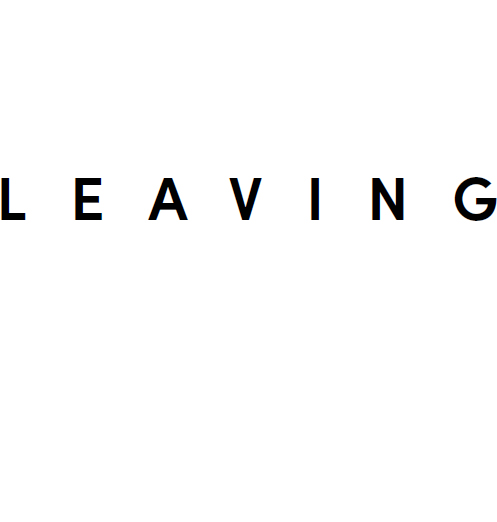

Herald Press
PO Box 866, Harrisonburg, Virginia 22803
www.HeraldPress.com
Study guides are available for many Herald Press titles at www.HeraldPress.com.
LEAVING SILENCE
2021 by Herald Press, Harrisonburg, Virginia 22803. 800-245-7894.
All rights reserved.
Library of Congress Control Number: 2021936517
International Standard Book Number: 978-1-5138-0817-8 (paperback);
978-1-5138-0818-5 (hardcover); 978-1-5138-0819-2 (ebook)
Printed in United States of America
All rights reserved. This publication may not be reproduced, stored in a retrieval system, or transmitted in whole or in part, in any form, by any means, electronic, mechanical, photocopying, recording or otherwise without prior permission of the copyright owners.
Unless otherwise noted, Scripture text is quoted, with permission, from the New Revised Standard Version, copyright 1989, Division of Christian Education of the National Council of Churches of Christ in the United States of America.
Scripture quotations marked (ESV) are from the ESV Bible (The Holy Bible, English Standard Version ), copyright 2001 by Crossway, a publishing ministry of Good News Publishers. Used by permission. All rights reserved.
Scripture quotations marked (NIV) are taken from the Holy Bible, New International Version , NIV. Copyright 1973, 1978, 1984, 2011 by Biblica, Inc. Used by permission of Zondervan. All rights reserved worldwide. www.zondervan.com. The NIV and New International Version are trademarks registered in the United States Patent and Trademark Office by Biblica, Inc.
25 24 23 22 2110 9 8 7 6 5 4 3 2 1
Dedicated to my three beautiful daughters,
Deborah, Gabrielle, and Carissa.
Every word I have written has been a prayer for your future.
Foreword
I n my early years as an evangelical after making the transition from Catholicism, I often found myself struck by the theological gymnastics many of my pastors and professors performed to try to explain the why behind many seemingly questionable things in the Bible. One such why concerned the story of Noah and why God would destroy the earthand most of the people and animals on itthrough a catastrophic flood.
We are told only that things became progressively evil and God regretted making humankind, deciding to start over by blotting out every living creature. Genesis 6 doesnt make it very clear what, exactly, is going on, introducing to the biblical narrative the presence of giants and divine beings that roamed the earth.
The reasoning I heard time and time again was that the corruption referred to the relations these divine beings and human daughters were having with one another. Not much more was said on the subject, and because the Bible felt so out of touch to me because of the theological gymnastics and lack of deep engagement with its difficulties, I didnt ask too many questions.
And then years later, after I graduated from seminary, #MeToo and #ChurchToo happened, and suddenly so many things that I had never really questioned in Scripture began to scream out at me from the pages of this sacred book. One day, I reread Genesis 6 and something peculiar caught my eye: The sons of God saw that the daughters of humans were beautiful, and they married any of them they chose (v. 2 NIV).
For the first time the thought crossed my mind: Perhaps it was this that made God regret making humankind: that men (some sort of divine being, apparently) had objectified and taken women for themselveswhomever they choseseemingly without their consent. Perhaps that was enough to make God want to start over.
I dont know for sure if the corruption and violence that made God regret creating human beings on the earth was indeed the sons of God taking whatever women they chose. But noticing this detail sparked a new leg in my journey of discovery and asking the hard and uncomfortable questions when it comes to sexualized violence and the Bible.
Perhaps many people today are wary of Scripture because weve been told to love God with all our heart, mind, soul, and strength while simultaneously being expected to disengage from these very same things when reading Scripture. In evangelical circles, many of us were trained to zip right through stories of sexualized violence without much emotion or questioningwithout a real wrestlingof the text. But loving God with our heart, mind, soul, and strength requires us to bring everything to the tableparticularly our doubts, questions, disagreements, fears, frustrations, and even our traumas.
And this is precisely what Susannah Larry invites readers to do in this powerful and important work. Through her brilliant exegesis, Larry encourages us to engage every part of ourselves, reminding us that God hates sexualized violence enough to do drastic thingslike give up divine privilege and hang naked on a crossin full solidarity, understanding and identifying with our deepest pain.

